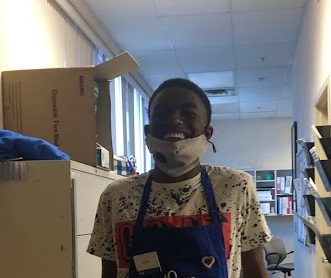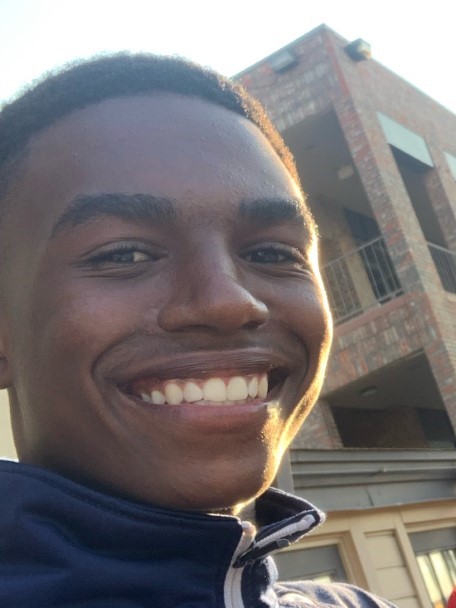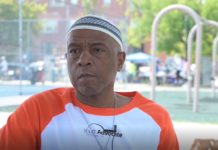North Texas — These days, when 16-year-old Terry faces a challenge, he breathes deeply and forces himself to think of something that makes him happy. The exercise is part of an emotional toolkit he assembled three years ago while receiving behavioral health services from Youth Advocate Programs (YAP), Inc.’s Bryan Humphrey.
“Three years ago, this wouldn’t have been Terry. With some of the things he’s gone through, he would have flipped out on someone,” said Vanessa, Terry’s mother. “When he gets frustrated, he can talk it out now and I’m so proud of him.”

A national nonprofit in 31 states and the District of Columbia, YAP partners with youth justice, child welfare, and behavioral health systems to provide community-based alternatives to youth incarceration, out-of-home placement, and residential treatment. YAP has been in the Dallas Metroplex for two decades, providing alternatives to detention, gang intervention, substance abuse prevention, and mental health services. The organization also recently became a provider of a violence prevention program called Dallas Cred. While YAP’s youth justice and child welfare program participants are referred by systems partners, recipients of the nonprofit’s violence prevention and behavioral health services can access YAP’s services directly. Individuals and families enrolled in Texas Medicaid or who have Children’s Health Insurance Plan (CHIP) can access YAP’s behavioral health services at no charge to them.
“YAP’s services are unique and therefore changing the trajectory of the lives of young people who are too often negatively impacted by incarceration and other congregate placement and treatment,” said YAP President Gary Ivory.

YAP’s evidence-based program model includes matching program participants with culturally competent, mostly neighborhood-based service providers who meet them where they are — in their homes or wherever they feel comfortable. Through its North Texas services, YAP is addressing a growing behavior and mental health crisis.
A 2018 study found that Black children ages five to 12 are about twice as likely to die by suicide as White children of the same age and new data find suicide rates among Black children and adolescents have been worsening.
Terry said that during his darkest moments, he considered taking his life more than once.
“I was not motivated. I felt suicidal,” he said.
Before connecting with Humphrey, Terry saw a couple of mental health counselors but could not make a connection. Then a nurse told Vanessa about YAP. “And along came Bryan,” she said.
“When he first came over, he had on a Brooks Brothers suit. But the next time, he was wearing jeans and I thought, ‘OK, he’s just like us. “He can relate to my son as a young Black man. He even came over for dinner once and ate with us. That’s something I know most therapists would never do.”
Terry remembers that first day, too, saying that it didn’t go well at all.
“At first I thought he was like everybody else. “He had on a suit. I talked to him but didn’t connect; I wasn’t sure where he was coming from.”

Soon, the location of their meetings changed. Humphrey started dressing to impress — in head-to-toe basketball gear. Each session at the neighborhood park started with a game where Terry jokingly said he realized there were a few things he could teach his counselor, too. But he agreed with Humphrey that a lot of serious business was also handled on the court.
“Working with him over time, I was able to get Terry to see that behaviors have consequences and that through coping techniques, he can keep himself from reacting in a way that will only make his challenges worse.”
Terry was struggling with lingering behavioral health challenges triggered by a life-altering traumatic series of events that had begun months earlier.
“I was at my middle school graduation and was looking around for my mother,” he said. Vanessa had been arrested after a computer repair technician saw someone else’s identity information on her secondhand computer. Terry remembers suddenly living with his father with no explanation.
“I kept asking, ‘Where’s mom?’ But no one would tell me. I had to figure it out. I was really sad,” he said. ‘My mom is a big support; I wanted her to see my achievements. I wasn’t able to talk to her. I didn’t know what was going on. I had a big whirlwind of emotions.”
Terry said he stopped applying himself at school. He pretended to be ok and became the class clown.
“Her being locked up; I locked up my emotions,” he said. “I had to hide it.”
When he could no longer hide it, he lashed out at his father.
“I got mad at him a lot. I had a lot of hatred. I blamed my dad.”
When his mom was released 53 days later, Terry learned she had lost her job and their home, which further fueled his anger. Then one day, an altercation with his father got physical.
“When I did what I did to my dad, I wouldn’t forgive myself,” he said. Bryan helped me with that, and he made me see the point of view of my dad and everyone else.”
Terry said each time with Bryan left him with a coping tool.

“He opened my mind. There were new lessons every time,” he said. “One of the first lessons that sticks with me is breathing. Taking in air when you’re angry and thinking of the things that make you happy instead of focusing on that thing that makes you mad.”
Vanessa saw her son making changes, opening up, and becoming the Terry she missed. Meantime, she said Humphrey also equipped her with skills to better guide her son’s journey.
“Bryan taught me to listen and not be so quick to jump the gun,” he said.
YAP discharged Terry from the program after a couple of years. Since then, he says there have been many times where he has had to pull from the toolkit that Humphrey helped him assemble. He recalled how early in 2020 just before the pandemic set in, he sustained an injury during a high school basketball game that left him unable to walk.
“[Before the injury] I’d been thinking that if I worked hard enough, I could go overseas and play after high school. Now I was in rehab for three months. It was hard,” he said. “But I never got down on myself. I stayed moving forward.”
Now a junior in high school Terry is catching up in school, back to practicing basketball and working part-time at a neighborhood grocery store.

“Sometimes he can still be a teenager. But now I have my son back — that sweet demeanor has returned. He’s now helping his sister when she’s going through things. The kid’s phenomenal,” Vanessa said. “The other day at his job, someone gave him a $50 tip, and he’s already getting a promotion to cashier. It’s awesome. I thank the Lord for YAP.”
YAP is hiring qualified mental health professionals, neighborhood-based Advocates, and other frontline workers. To learn more about YAP’s services and how you can join the organization’s staff in North Texas and across the nation, please visit www.YAPInc.org. Follow YAP on Twitter @YAPInc.
Note: Qualified Mental Health Professionals have a Bachelor’s in a human service field (psychology, social work, medicine, nursing, rehabilitation, counseling, sociology, special education, etc.) They have experience working with youth who have had a diagnosable mental, behavioral, or emotional disorder that limits the child’s role or functioning in family, school, or community activities



















